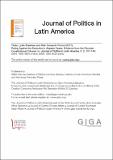| dc.description.abstract |
In this paper, we systematically analyze decisions made by the Peruvian Constitutional Tribunal from 1996 to 2006 in amparo cases, which significantly impact individual rights. We ask the following question: in these types of cases, what conditions led the Tribunal to assert itself against the executive? Through an analysis of Tribunal decisions during the presidencies of Alberto Fujimori and Alejandro Toledo, we find that the Tribunal is more likely to rule against the executive, as the public’s confidence in the executive decreases and as the share of congressional seats of the president’s party declines. Further, the Tribunal is more willing to decide cases against the executive in areas that most pervade its docket, specifically in the areas of pensions and employment. These findings add to the comparative and American judicial politics literature by showing that high courts, even rela- tively weak ones, follow politics, but that case subject area and prevalence may temper this tendency. |

